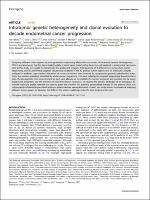Intratumor genetic heterogeneity and clonal evolution to decode endometrial cancer progression
Author
Date
2022-03-25Permanent link
https://hdl.handle.net/11351/8023DOI
10.1038/s41388-022-02221-0
ISSN
1476-5594
WOS
000754012300003
PMID
35145232
Abstract
Analyzing different tumor regions by next generation sequencing allows the assessment of intratumor genetic heterogeneity (ITGH), a phenomenon that has been studied widely in some tumor types but has been less well explored in endometrial carcinoma (EC). In this study, we sought to characterize the spatial and temporal heterogeneity of 9 different ECs using whole-exome sequencing, and by performing targeted sequencing validation of the 42 primary tumor regions and 30 metastatic samples analyzed. In addition, copy number alterations of serous carcinomas were assessed by comparative genomic hybridization arrays. From the somatic mutations, identified by whole-exome sequencing, 532 were validated by targeted sequencing. Based on these data, the phylogenetic tree reconstructed for each case allowed us to establish the tumors’ evolution and correlate this to tumor progression, prognosis, and the presence of recurrent disease. Moreover, we studied the genetic landscape of an ambiguous EC and the molecular profile obtained was used to guide the selection of a potential personalized therapy for this patient, which was subsequently validated by preclinical testing in patient-derived xenograft models. Overall, our study reveals the impact of analyzing different tumor regions to decipher the ITGH in ECs, which could help make the best treatment decision.
Keywords
Endometrial cancer; Clonal evolution; MutationBibliographic citation
Mota A, Oltra SS, Selenica P, Moiola CP, Casas-Arozamena C, López-Gil C, et al. Intratumor genetic heterogeneity and clonal evolution to decode endometrial cancer progression. Oncogene. 2022 Mar 25;41:1835–50.
Audience
Professionals
This item appears in following collections
- HVH - Articles científics [4476]
- VHIR - Articles científics [1751]
The following license files are associated with this item:

 Private area
Private area Contact Us
Contact Us








